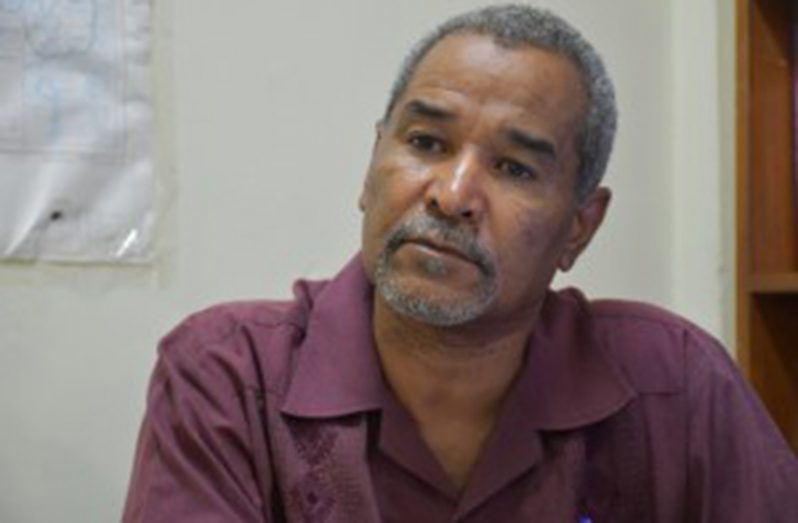– Dr Sagala wants mental health expert more frequently in Region Seven
MENTAL health patients of Cuyuni/Mazaruni (Region Seven) want the government to restore psychiatrist, Dr Bhiro Harry’s monthly visit to the mining area.
A request was made by Dr Edward Sagala, Regional Health Officer (RHO) of Region Seven to the Ministry of Public Health (MoPH) to ensure that the mental health clinics continue to be held at the Bartica Regional Hospital monthly instead of quarterly.
“This decision of quarterly visits needs to be revisited since the 26 patients who depend on this service are the ones suffering,” Dr Sagala explained Wednesday while delivering his 64-page report at the three-day review meeting of the Regional Health Services (RHS) held at the Lake Mainstay Resort in Pomeroon/ Supenaam (Region Two).
He said the patients suffering from neuropsychiatric disorders, or mental illnesses, in the region look forward for Dr Bhiro Harry’s mental health team monthly visits.
“It was a good thing which the patients liked,” since they did not have to travel long distances anymore; as far as Parika or Georgetown Public Hospital Corporation (GPHC) to receive mental health treatment, Sagala said.
He said the monthly clinic has also been “well-received” by patients not only from Bartica and its environs, but also from mental health patients from Essequibo Islands/West Demerara (Region Three); Potaro/Siparuni (Region Eight); and Upper Demerara/Berbice (Region 10) who all benefit from existing services available in that region.
In Guyana, neuropsychiatric disorders are believed to affect some 25 per cent of the country’s 750,000 multi-racial population, with women, young adults and ranks of the unemployed being the most vulnerable.
At the national level, mental health is ranked among the central planks of the government’s overall public health programme with the Ministry of Public Health giving it prominence in the service priorities of the 2013-2020 National Health Sector Strategy with the stated vision “that the people of Guyana are among the healthiest in the Caribbean and the Americas.”
This plan was developed jointly between the MoPH, the Mental Health Team of the Georgetown Public Hospital Corporation (GPHC) and the Pan-American Health Organisation (PAHO) Guyana. It outlines strategic actions on how to implement and scale-up interventions and primary care services for mental health.
The MoPH established a Mental Health Unit which is headed by specialist Dr Util Richmond-Thomas. The mission statement of the new department is: “To promote, coordinate and implement technical activities and actions directed towards strengthening the national capacity to develop policies, plans, programmes and services, thus contributing to the promotion of mental health, the reduction of the burden of the psychiatric diseases, prevention of disabilities and the development of rehabilitation.”
POSITIVE IMPACT
Dr Sagala further highlighted the positive impact of quality healthcare delivery, especially at the Bartica Regional Hospital resulting from the assigning of eight medical specialists at that institution, viz, general surgeon, obstetrician and gynaecologist, paediatrician, internist, dermatologist, anaesthesiologist, orthopaedic/trauma surgeon and radiographer.
During the review period, over 15,000 patients were seen between these medical specialists and over 400 surgeries were performed, “drastically reducing referrals to GPHC which previously was over-burdened,” Sagala said.
He thanked the MoPH and the GPHC for this initiative which has and continues to be well appreciated by the hinterland community and which has bridged the gap in the quality of healthcare delivery available between the coastal and hinterland areas. The continuation of this initiative is critical to ensure equitable healthcare to the populace.
In the past, specialist care was not available in the hinterland areas except during medical outreaches.
In his presentation, Dr Sagala spoke about the haemorrhaging of trained health workers in Region Seven, noting that “we seem to be training different categories of health workers, but the challenge remains that of retention.”
“The reasons for this problem are various and the solutions will have to be dealt at a national level,” said Sagala Although a lot has been achieved during the year under review, Sagala said Cuyuni/Mazaruni “continue to face challenges in the areas of human resources, repairs of medical equipment, accommodation for all categories of healthcare providers and the chronic shortage of basic medical supplies”.
Malaria, dengue, gastrointestinal and respiratory disorders, snake bites, accidents, trauma and violence, sexually transmitted diseases (STDs), teenage pregnancy, suicide attempts and conditions related to substance abuse remain major health challenges within the region.
Some 28,000 to 30,000 persons inhabiting the sprawling interior mining community seek medical attention for hypertension, heart disease, gastro-intestinal disorders, diabetes, vector-borne diseases, malaria, dengue, pregnancy-related conditions, skin conditions, snake bites, accidents, trauma, violent acts and mental disorders, in that order.
Sagala said the five leading causes of death in Cuyuni/Mazaruni are respiratory disorders, gastro-intestinal conditions, neonatal conditions (sepsis, prematurity) multifactorial (accidents and trauma) and congenital malformations.
Sexually transmitted infections (STIs), teenage pregnancy, attempted suicide and substance abuses, especially the use of alcohol and drugs are emerging challenges for regional officials, Dr Sagala said.




.png)









